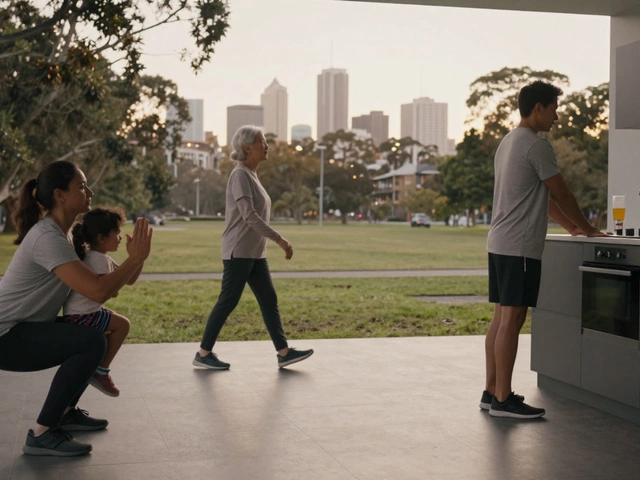10 Proven Tips for Good Health and Wellness in Daily Life

Picture this: you wake up, feeling genuinely rested. Your mind’s clear, your body’s not weighed down, and the morning starts with more energy than dread. If that sounds like a distant dream, you’re not alone. Busy lives, endless notifications, and the temptations of an all-you-can-eat delivery app can make the basics of good health seem out of reach. The truth? Building a healthy lifestyle doesn’t have to mean stubbornly slogging through green juices or spending hours at the gym every day. It’s about weaving small, smart decisions into your daily routine—actions so doable that even my teenage son Lucan (whose default food group is pizza) can’t argue with them.
Small Habits That Bring Big Results
Let’s be real: nobody has unlimited time or motivation. That’s why the habits that stick are the ones you can fit in even on your roughest days. If you want sustainable health, start with these science-backed tips:
- Drink water before you reach for coffee. Research in the journal “Nutrients” found that even mild dehydration can mess with your mood, zap energy, and hurt brain power. A glass of water at wake-up primes your system. Keep a bottle nearby and refill throughout the day.
- Prioritize movement. No, you don’t need a fancy trainer or a CrossFit membership. The CDC says that brisk walking, cycling, or even active play with your kids burns calories and lowers the risk of chronic disease. I often challenge Lucan to “walk-and-talk” errands or backyard soccer when he gets twitchy from screen time.
- Keep a sleep routine—even on weekends. Skipping out on regular sleep to binge-watch just one more show? A recent American Academy of Sleep Medicine study showed that inconsistent sleep patterns can make you feel groggy all week. Go to bed and wake up at consistent times, and your body will thank you.
- Add color to your plate. No food fads here—just an easy trick. Extra fruits and veggies mean more antioxidants and fiber. Quick fix: pack cut-up veggies for snacks, or add spinach to your eggs.
- Limit sugary drinks, even juice. Harvard’s School of Public Health points out that liquid sugar spikes may be sneaky but they hit your body fast, raising diabetes risks. Swap in sparkling water, green tea, or just good old water.
- Snack smart. Keep nuts, fruit, or plain yogurt handy on busy days. Fast food is all too easy when you let yourself get hangry. We keep roasted almonds and apples in the kitchen—it helps curb late-night foraging.
- Learn to manage stress. Quick breathing exercises, a walk, or just stepping away from a screen can shrink those tense moments. John Kabat-Zinn, founder of mindfulness-based stress reduction, says,
“You can’t stop the waves, but you can learn to surf.”
Stress happens. It’s how you surf it that counts. - Wash your hands. Seems basic, but infectious disease experts have a phrase: "soap saves lives." Twenty seconds can dramatically lower your odds of catching whatever’s circulating at school, work, or the gym.
- Build connections. Studies from Harvard underline that people with meaningful relationships get sick less, heal faster, and live longer. Your circle doesn’t need to be big; it just has to be real. Text someone, call a friend, or play a board game with family.
- Get yearly checkups—even if you feel fine. Preventive care spots issues long before you ever notice them. That quick appointment could mean years added to your life.
These habits sound simple, right? Yet, the magic is in the doing. Just try adding one to your routine this week. Over time, these small steps pile up—and suddenly, you realize you’re feeling stronger, thinking clearer, and dodging the seasonal blues more easily.
By the way, even if you're convinced you'll never be a "health nut," remember: it’s not about extremes; it’s about consistency. When my son realized skipping breakfast ruined his mood, he started keeping bananas in his backpack. Not perfect, but better than donuts.
Science shows that people who make gradual changes—rather than drastic ones—are healthier a year down the line. Want a bonus habit? Cut yourself some slack. If you skip a workout or find yourself devouring a whole pizza with your kids (looking at you, Lucan), don’t guilt spiral. Just hit reset tomorrow.

The Power of Food, Sleep, and Mindfulness
Let’s dig deeper into the pillars that prop up your health: nutrition, rest, and your state of mind. Trends come and go, but these fundamentals never change.
Nutrition doesn’t have to be a maze of macros or meal plans. The best advice? Eat mostly whole foods—think grains, beans, nuts, vegetables, fruits, fish, and poultry. According to the World Health Organization, diets rich in these foods help prevent heart disease, some cancers, and diabetes. Steer clear of ultra-processed surprises with ingredient lists that read like chemistry homework.
If cooking feels overwhelming, keep it simple. One of my favorite quick meals is roasting a sheet pan of veggies tossed with olive oil and salt. It’s easy, kid-approved, and packs a punch of vitamins. Got picky eaters? Try dips or smoothies—Lucan loves spinach hidden under a mound of berries in his morning shake.
Now, about sleep: it’s not just "resting." It’s when your body repairs muscles, balances hormones, and cements memories. Bad sleep shows up fast, from trouble focusing at work to crankiness with your family. Aim for seven to nine hours, stick to a cool, dark room, and limit late-night screens since blue light messes with melatonin. Even a 15-minute wind-down ritual (like stretching, journaling, or reading something old-school) triggers your brain’s bedtime mode.
If stress is the thief of sleep, mindfulness is your alarm. It means paying attention to the present—no judgment, just observing your thoughts. Mindfulness reduces anxiety and even chronic pain, as proven in a landmark 2016 trial published in JAMA. Simple mindful hacks: pause for three deep breaths when stressed, focus on the taste of your food, or check in with your body while sitting at your desk. Apps can help, but you don’t need anything special to get started.
And don’t forget social support. We humans are wired for connection—even if your idea of bonding is yelling at the TV during a game or swapping memes in a group chat. Loneliness is as dangerous for your health as smoking a pack a day, per a 2023 CDC report. Invite a friend out for coffee, volunteer in your community, or just hang out with neighbors. It all counts.
Mental health matters just as much as physical. Don’t wait to ask for help if you need it. Call your doctor, a counselor, or text a trusted friend. Some days are tough, but nobody has to go it alone.
Your body is a feedback machine. Notice how different choices make you feel. Pay attention, tweak your habits, and listen when your body says "enough." Health isn’t about following rules—it’s about building a life that feels good to live.

Real-Life Success: Making Tips Work for You
No two people live exactly the same way, but nearly everyone can tweak their day to fit in healthier choices. Want to get serious about putting these tips into play? Here are a few strategies that work (even for people who hate health advice):
- Start with a strengths inventory. What are you already doing right? Build from there. For me, I walk my dog every morning, so getting steps in is covered. For you, it might be batch-cooking lunches, or calling your mom every Sunday.
- Pair new habits with something you already do. It’s easier to remember vitamin D when you keep the bottle beside your toothbrush. Want to meditate? Do it right after you pour your morning coffee.
- Set visible reminders. Notes on the fridge, alarms on your phone, a fruit bowl in the middle of your kitchen table—these nudges keep your intentions top of mind. Out of sight can really mean out of mind, especially for healthy snacks.
- Track your progress, but don’t obsess. A visual calendar or habit tracker gives a little dopamine hit each time you check a box. But if you fall off for a week, don’t quit altogether. A setback isn’t failure; it’s feedback.
- Enlist an accountability buddy. My son and I team up for family meals, and we dare each other to see who gets the most steps. Group challenges, fitness apps, or even gentle competition at work can keep motivation up.
- Reward yourself, but not with sabotage. Celebrate progress with an experience—like a movie night or a mini hike—not with a junk food binge. Positive reinforcement beats punishment every time.
- Make gradual swaps, not drastic overhauls. Replace one soda a day with water, or swap late-night chips for popcorn. After a month, these changes feel second nature.
- Learn from slip-ups. We all mess up (I’m looking at my empty ice cream cartons as I write this). Instead of feeling bad, think about what triggered the choice, then adjust your environment to help next time.
- Share your wins and challenges. When you talk about your goals, especially with kids or close people, it builds stronger habits for everyone. Kids learn by example—if Lucan sees me lace up for a walk every evening, he’s more likely to join in.
- Get curious and keep learning. Read about health, try new foods, or test out movement you never thought you’d like (I survived beginner yoga, barely). Curiosity energizes habits, so you don’t get bored or rigid.
Nothing here requires perfection or pain. If you can make just one small choice each day that supports your health, that stacks up quicker than you think. One morning, you’ll notice you’re breathing easier on a walk, or your mood’s steadier when life gets bumpy. Trust me, as someone whose home is sometimes a circus of soccer gear and snack wrappers—the small stuff matters.
To wrap it up, good health doesn’t belong only to fitness junkies or meditation gurus. It’s for every busy parent, every overworked student, every pizza-loving teen (yep, Lucan, I mean you). Change is possible—one ordinary, stubbornly consistent step at a time.




